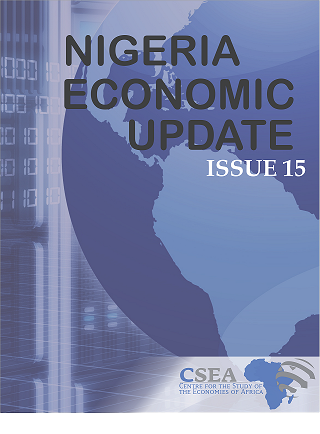Consumer Price Index, the measure for inflation rate, declined (Year-on-Year) for the fourteenth consecutive month in March 2018. Headline inflation dropped to 13.34 percent1 – representing a marginal 0.99 percentage-points decrease, and lowest inflation rate in two years. The sub-indices moved in tandem with headline inflation as food inflation fell from 17.59 percent to 16.08 percent, while core inflation moderated to 11.20 percent, down slightly from 11.70 percent. The year-on-year decline is attributable to base effects of higher prices in corresponding month of 2017. Additionally, stable exchange rate moderated the impact of imported consumer goods prices2. Going forward, to stimulate further decline in both food and core inflation rates, it is necessary to promote investment in the agriculture sector as well as to foster policies that promote forex reserve growth and exchange rate stability.
Macroeconomic Report & Economic Updates

March 8, 2018
Nigeria Economic Update (Issue 15)
Consumer Price Index, the measure for inflation rate, declined (Year-on-Year) for the fourteenth consecutive month in March 2018. Headline inflation dropped to 13.34 percent1 – representing a marginal 0.99 percentage-points decrease, and lowest inflation rate in two years. The sub-indices moved in tandem with headline inflation as food inflation fell from 17.59 percent to 16.08 […]
Read →
Related
Nigeria Economic Update (Issue 20)
The Naira maintained slight appreciation against the dollar in the review week. At the parallel market, the value of the Naira appreciated week-on-week by 1.6 percent to exchange at N380/$ on May 19, 2017. In addition, inter-bank market rate appreciated slightly by 15kobo to N305.45/$. The appreciation in both segments of the market are favorable effects of the CBNs continued forex supply in the week under review (In a bid to further ease forex liquidity, the CBN pumped a total of $457.3 million on May 15, 2017).
Nigeria Economic Update (Issue 24)
Crude
oil price increased, in the week under review, to its highest price in 2016. Nigerias
bonny light increased by $1.38 from $48.02 per barrel on May 20, 2016 to $49.64
per barrel on May 27, 2016, while Brent crude was sold for $50 per
barrel on May 26, 2016. The catalyst for price gains in the period
under review is the supply-side contractions, with unplanned production shortages
in Nigeria, Canada and Iraq. The upward trend of prices may unlock
more supplies in subsequent weeks, but the OPEC meeting scheduled for June 2,
2016, could moderate the effect. Nigeria is expected to benefit from crude oil
price rising above the $38 per barrel benchmark. Unfortunately, supply
disruptions continue to negatively affect oil revenue and may have contributed
to the depletion of external reserve by over $153 millionthis
week. The federal government, in collaboration with relevant security agencies,
should find a lasting solution to the vandalism of oil pipelines and production
facilities.
